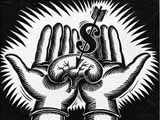Today.Az » Weird / Interesting » Organ trafficking trial exposes grisly trade
20 May 2010 [13:10] - Today.Az
 A Beijing court is prosecuting a man for illegal organ trafficking, local media reported, putting the spotlight on a grisly black market in body parts in a country where demand for transplants far outstrips supply.
A Beijing court is prosecuting a man for illegal organ trafficking, local media reported, putting the spotlight on a grisly black market in body parts in a country where demand for transplants far outstrips supply.
Half a liver can be bought for 45,000 yuan ($6,590), while an entire transplant including operation and recovery costs, can be completed for 150,000 yuan, according to a defendant from another organ trafficking trial prosecuted at the same court last month.
China in 2007 banned organ transplants from living donors, except spouses, blood relatives and step or adopted family members, but only launched a national system to coordinate donation after death last year. Its efficiency has yet to be proved. Nearly 1.5 million people in China need organ transplants each year, but only 10,000 can get one, according to the Health Ministry.
The defendants in the two Beijing trials face up to five years for their role as go-betweens between donors and buyers, which could "damage society and moral values," the Procuratorial Daily reported. They are still waiting for their verdict. But at least two of them say they are being unfairly hounded for playing a vital role in helping both the sick and poor.
"I believe I was helping people, not harming others," the paper quoted defendant Liu Qiangsheng as saying.
Liu says he got into the business after selling half his own liver in 2008 to help pay for this father's medical bill. A friend of the recipient, who was waiting in despair for a liver, asked him to find another organ provider.
"I saved the life of the person who received my liver. He was only in his 30s. I do not regret it," he said.
His partner, Yang Shihai, had also sold one of his own kidneys, the paper reported.
"The donors were free. They were not controlled by us. They sold their organs voluntarily," it quoted Yang saying.
Middlemen specialized in faking documents allowing donations between strangers have helped raise transplants from living donors to 40 percent of donations, from 15 percent in 2006, the official China Daily reported last year. However the majority of organs for transplant are still harvested from executed criminals, the paper said. Beijing hopes the new system will end both live transplants and taking organs from prisoners, which makes senior officials uncomfortable.
"(Executed prisoners) are definitely not a proper source for organ transplants," Vice Minister Huang Jiefu told China Daily.
/Reuters/
|
|